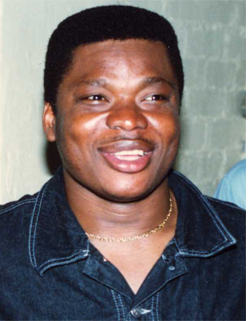|
 Star, Rigo (Bamundele, Rigobert), exceptional Congolese guitarist and arranger; born Kinshasa, Aug. 28, 1955. Star, Rigo (Bamundele, Rigobert), exceptional Congolese guitarist and arranger; born Kinshasa, Aug. 28, 1955.
As a boy growing up in Kinshasa, Rigo picked up his uncle's guitar and taught himself to play. He gained proficiency in a succession of neighborhood groups until 1977 when he joined Papa Wemba's new band, Viva la Musica. In his role as lead guitarist, Rigo helped to shape Viva's evolving sound, picking out a cascade of single notes in the style of the great Docteur Nico.
In 1981, with the band on tour in Europe, Rigo dropped out to join the growing colony of Congolese musicians in Paris. He quickly found recording session work, contributing lead or rhythm guitar lines to albums by Pamelo Mounk'a, Théo Blaise Kounkou, and Kosmos, among others. He also recorded a solo LP, Ringo Star [sic], for producer Eddy Gustave. In the mid-eighties Rigo worked on Kanda Bongo Man's sensational Malinga and Abeti's Je Suis Fâché, an album that went gold in France (sales of 100,000 or more). Near the end of the decade he played guitar and bass on Koffi Olomide's stunning Tcha Tcho (a.k.a. Rue d'Amour) and lead on Sam Mangwana's Aladji.
Rigo earned highest praise for his work with former Afrisa singer Mbilia Bel. He arranged the music and laid all the guitar and bass tracks for 1988's phenomenal Phénomène, one of Congolese music's all-time great albums. Subsequent collaborations with Mbilia were less successful. For her Desolé!!! (1991) Rigo wrote all the songs, played nearly all the instruments, and sang backing vocals in a one-man-band approach that produced a notable, albeit rare, failure.
Rigo's work was not confined to Paris. In New York in 1989 he played guitar on a song for Paul Simon's Rhythm of the Saints. In California he recorded Yalowa (1996) with Mbilia and newcomer Vivick Matou, a fine but largely overlooked album based in the Congolese rumba. Rigo abandoned the rumba altogether on a second California date that produced Got the Feeling (1997), a dozen "smooth jazz" tracks that, if nothing else, demonstrated his remarkable versatility. The record company's subsequent bankruptcy doomed both California-produced discs and sent Rigo packing for Paris where he resumed his work as arranger and session player.
One of Rigo's most prominent projects was his participation with a new formation of old hands, called Kékélé (Bumba Massa, Loko Massengo, Wuta Mayi, Syran M'benza, and Nyboma Mwan Dido), on the group's 2003 release Congo Life
Rigo ranks with the best of Congolese music's second generation, those who came of age in the 1970s. Always an experimenter, Rigo felt constrained by the expectations of Congolese music fans, who loathed to tolerate much tinkering. His generous use of overdubs and synthesizers has been roundly criticized. Nevertheless, he is an excellent guitarist and first-rate arranger, still working in the much-diminished Congolo-Paris recording business.
© 2011 Gary Stewart
SELECT DISCOGRAPHY
Yalowa (IMA 1003) 1996; Got The Feeling (IMA 5001) 1997.
With Kékélé: Congo Life (Stern's STCD 1097) 2003.
With Mbilia Bel: Phénomène (Flash Diffusion FDB300016) 1988; Désolé!!! (Mélodie 66887-4) 1991; 8/10 Bénédicta (Sonodisc CD74343) 1996.
With Viva la Musica: La Naissance de L'Orchestre Viva la Musica (Ngoyarto NG026) seventies recordings reissued 1997.
SELECT BIBLIOGRAPHY
G. Stewart, Rumba on the River (London and New York, 2000).
|

